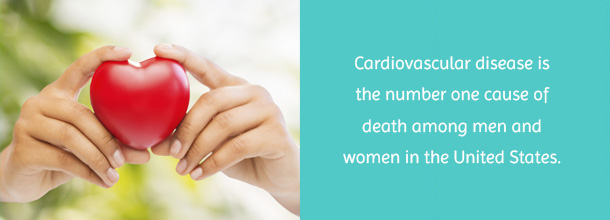
February is a month all about the heart -- and not just through showing appreciation for friends and loved ones on Valentine’s Day. It’s a time to recognize the importance of heart health during American Heart Month. Cardiovascular disease is the number one cause of death among men and women in the United States. There are a number of risk factors that contribute to developing heart disease including age, gender (men are at more risk), family history, smoking, poor diet, obesity, hypertension, high cholesterol (LDL), diabetes and lack of physical activity. Here are some strategies that can help you prevent heart disease:
Stop smoking – Smoking puts you at significantly more risk of developing heart disease. The chemicals in tobacco can damage the heart and narrow the arteries, which can lead to a heart attack. If you are a smoker, it’s not too late to make a difference. Quitting will reduce your risk to the level of a nonsmoker in about five years.
Regular exercise – A sedentary lifestyle puts people at greater risk of heart disease. Getting at least 30 minutes of moderate to intense physical activity most days a week will strengthen your heart and cardiovascular system, improve your oxygenation, as well as help you reduce body fat, increase strength and lower blood pressure. So sit less and get that blood pumping.
Heart-healthy diet – A diet rich in fruit, vegetables, whole grains and certain types of fish, like salmon, can help you stay healthy and manage your weight. Be sure to limit fat intake like saturated, polyunsaturated, monounsaturated and trans fat, which can be found in foods like red meat, dairy, fried foods, packaged foods and bakery product.
Lose Weight – An unhealthy weight puts strain on your heart and increases your risk factors for heart disease, stroke and diabetes. BMI numbers of 25 and higher can be associated with higher blood fats and blood pressure. If you need to lose weight, don’t be discouraged. Simple lifestyle changes can make the difference toward your weight goals.
Sleep – Believe it or not, getting a good amount of sleep each night not only reduces tiredness, but also helps reduce your risks of obesity, high blood pressure and heart attack. In fact, insomniacs who take longer than 14 minutes to fall asleep face an even greater risk of hypertension, according to the American Heart Association. Try to reduce stress and get some good sleep - 7 to 9 hours a night is recommended. If you’re a night owl, you may have to adjust your schedule to make sure you get plenty of rest each night.
Health Screenings – Make sure to check your blood pressure and cholesterol levels regularly. Untreated hypertension can cause hardening and thickening of arteries, which narrows the vessels, while high cholesterol can cause plaques in the vessels. Having a diabetes screening is a good idea also, since the disease can put you at significantly more risk of developing heart disease. If you’re not sure if you are at risk for heart disease, talk to your doctor.
Sources: Heart.org; Mayo Clinic.org
